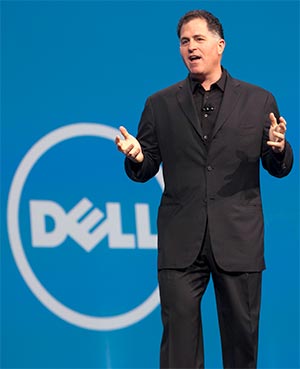With the recent announcement that Michael Dell will take his company private in a $24 billion leveraged buyout, there are several things to keep an eye on both as a consumer and an investor.
This deal is already historic because of its sheer size – it’s the largest private equity deal since the financial crisis – but it’s also significant because Dell has become a household name ever since it was founded in Michael Dell’s dorm room at The University of Texas in 1984. The company has since become one of the largest PC makers in the world, all the while sticking to its original mantra of letting consumers customize their machines to their own specifications.
However, as we have all witnessed, growing competition from companies like Lenovo and Samsung has driven down profit margins and eaten into Dell’s overall market share. Gartner, the information technology research firm, recently reported that Dell’s worldwide PC sales dropped 12.3% in 2012, compared with the year earlier. Furthermore, the dominance of smart phones and tablets has only taken further market share away from Dell.
While PC manufacturing still makes up about half of Dell’s business, Mr. Dell has been fairly successful at re-tooling the company to become more of a software provider to large corporations, to the tune of a company like Oracle or I.B.M. But investors have not shown very much confidence in the company or its management, headed by Mr. Dell as Chairman and CEO. The company’s stock has plummeted almost 60 percent over the last ten years. While this lagging stock price has been a thorn in the side of Dell executives, it has also provided them with an opportunity to re-shape their company, which they think is severely under-valued by the markets.
Under the proposed deal, about $3 billion in cash will be put up by Silver Lake Investments and Microsoft, Mr. Dell will contribute his roughly 14 percent stake in the company, and a staggering $15 billion of debt will finance the majority of the deal. Of course, like any LBO, the debt incurred by the company is meant to force management to “cut the fat” and invest in long-term growth initiatives that might otherwise be hard for a publicly held and regulated company.
Ideally, Dell will be able to more effectively follow the path laid out by its founder, without worrying about shareholder scrutiny. And given the fact that Microsoft has a stake in the deal, it is safe to say that there are considerable concerns and ambitions for the I.T. industry at large.
Whether this buyout will successfully accomplish Mr. Dell’s ambitious goals of turning Dell around and transforming his PC maker into a diversified I.T. solutions provider remains to be seen. But one thing we know for sure, Michael Dell is capable of accomplishing some pretty incredible things.
Under the deal investors will pay $13.65 a share in cash, a premium of 25 percent above Dell’s share price prior to news of the buyout.












